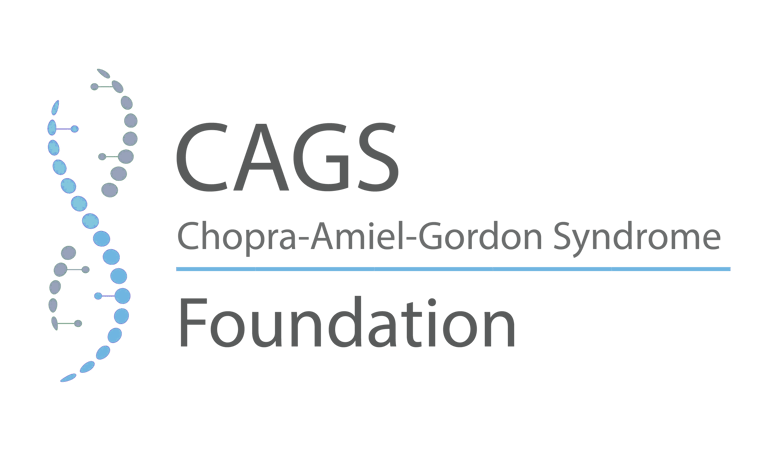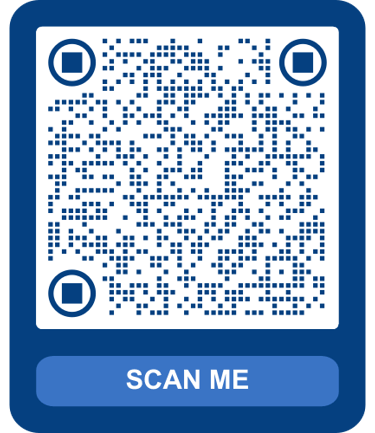Facts & Frequently Asked Questions
Updated: May 26, 2025
What is Chopra-Amiel-Gordon Syndrome (CAGS)?
CAGS is a rare genetic syndrome. Individuals with CAGS have a variant (gene change) which impacts the function of one copy of the ANKRD17 gene.
CAGS was first described in 2021 by doctors Maya Chopra and Jeanne Amiel, and Chris Gordon.
The most common symptoms are neurodevelopmental differences, including developmental delay, particularly affecting speech, variable intellectual disability, and learning and behavior challenges.
Other features include epilepsy, frequent infections, minor eye differences, growth and feeding concerns, and kidney abnormalities.
What is the genetic basis of CAGS?
ANKRD17, a gene located on chromosome 4, produces a protein which is important in development, especially for the brain.
CAGS is caused by a pathogenic variant (a variant which affects gene function) in one of the two copies of ANKRD17.
Typically, these variants are “spelling differences” in the gene code. These variants prevent that copy of the ANKRD17 protein from being made correctly, or at all. With only one working copy of ANKRD17, many parts of the body develop, grow, and function differently than individuals with two working copies.
Some individuals with CAGS have a type of variant called a deletion which can impact most or all of the ANKRD17 gene. Deletions can also impact other nearby genes on Chromosome 4. Individuals with a deletion of ANKRD17 and other nearby genes have features of CAGS and possibly other clinical features.
What is the inheritance of CAGS?
CAGS has an autosomal dominant inheritance pattern. “Autosomal” means that the gene is located on one of the numbered (non-sex) chromosomes. Because the gene is not located on a sex chromosome, an individual’s sex does not influence how the gene is passed from one generation to the next.
In autosomal dominant inheritance, only one of the two copies of the gene needs to have the pathogenic variant in order for the individual to have the condition.
In most individuals with CAGS, the ANKRD17 gene variant is de novo, meaning that the change was not inherited from a parent, but started in that individual at conception by chance. For others, the ANKRD17 gene variant is inherited from a parent who also has CAGS.
An individual with CAGS has a 50% chance of passing on the copy of the gene with the pathogenic variant each time they have a child. This means each child has a 50% chance of inheriting CAGS from their affected parent.
For parents of a child with CAGS and a confirmed de novo ANKRD17 variant, the chance of having another child with CAGS is low, estimated to be around 1%.
How is CAGS diagnosed?
CAGS is typically diagnosed by providers with expertise in rare genetic disorders, following genetic testing in a clinical laboratory. Different types of tests can identify pathogenic variants in the ANKRD17 gene.
Exome or genome sequencing - these are broad genetic tests looking for variants across all genes.
Gene panel - genetic test looking at variants in a specific limited set of genes.
Chromosome microarray (CMA), test which identifies larger sections of extra or missing genetic material including ANKRD17 (and possibly other genes).
What are the symptoms of CAGS?
Individuals with CAGS have a range of symptoms. The syndrome is very variable and can range from mild to severe. Many individuals with CAGS lead healthy and fulfilling lives.
Although the list of clinical features of CAGS is long, not every individual will have every feature.
Researchers are still learning about the spectrum of features of this rare syndrome, especially with how they change over time.
Neurodevelopment - Almost all individuals with CAGS have varying degrees of developmental delay, particularly affecting speech. There may be some challenges with specific areas of learning and attention. Some individuals with CAGS have intellectual disability. Autism spectrum disorder (ASD) and attention deficit hyperactivity disorder (ADHD) may also be diagnosed in individuals with CAGS.
Epilepsy - Up to 50% of individuals with CAGS have epilepsy. There is a range of seizure types, most commonly absence seizures. Typically, epilepsy is well managed with medication. Drug-resistant epilepsy is uncommon in CAGS.
Motor - Some infants with CAGS have “low muscle tone” or hypotonia. There may be delays in reaching motor milestones. While almost all children reach the stage of walking independently, there may be some concerns about balance and coordination.
Growth and feeding - Some children with CAGS grow more slowly than their peers, sometimes due to feeding difficulties, including challenges with swallowing or with certain food textures. A minority of children need a feeding tube for a period of time to help them gain weight.
Recurrent infections - Children with CAGS are predisposed to frequent infections, both bacterial and viral. Typically, these are throat, middle ear, sinus, and respiratory infections.
Kidney - Individuals with CAGS may have minor abnormalities of the kidneys. Some individuals have only one instead of two kidneys.
Ophthalmological - Many individuals with CAGS have ophthalmological (eye and/or vision) features. These include being long-sighted or short-sighted, or having a turn in the eye (strabismus).
Other - Many individuals have shared facial features, but also look like members of their own families. They may also have fair skin with visible veins. Some individuals are hypermobile, or seem to have increased joint flexibility. Less frequent features of CAGS include cleft palate and scoliosis.
How is CAGS managed?
Children and adults with CAGS should be managed under the care of a provider with expertise in rare disorders. Given the complex nature of the syndrome, a team of specialists is often involved in the care and management of individuals with CAGS.
While there is no specific treatment for CAGS, many of the features can be managed with supportive therapies and medical care. Care is tailored to meet individuals’ needs.
Anti-seizure medication may be recommended to help manage epilepsy.
Close developmental follow-up with early intervention and individualized education plans (IEP) to meet learning and social needs.
Physical and occupational therapy as required. Particular attention should be paid to expressive language with intensive speech therapy if required. Some individuals benefit from alternative and augmentative communication (AAC) devices.
Ophthalmology evaluation is recommended for all individuals.
Renal ultrasound is recommended at diagnosis.
Consideration of referral to an immunologist.
Genetic counselling is recommended.
The Chopra-Amiel-Gordon Syndrome (CAGS) Foundation provides essential resources and community support for those affected by CAGS:
Join the Foundation: Become part of a community dedicated to advancing research and improving care.
Foundation Website: curecags.org - Explore resources and join the community.
Facebook Group: Connect, share experiences, and find support with other families and caregivers.
CAGS Clinic: To find out more about CAGS Clinic at Boston Children’s Hospital (BCH) please email Abigail.Sveden@childrens.harvard.edu
Frequently Asked Questions
What is the life expectancy of individuals with CAGS?
To date, there is no current evidence that CAGS is a life-limiting syndrome.
What level of independence can individuals with CAGS achieve?
The features of CAGS vary amongst diagnosed individuals. Some individuals require significant support while others live predominantly independent lives. It’s difficult to predict the future independence of young individuals diagnosed with CAGS.
I’ve just received a diagnosis of CAGS, what are the next steps?
Meeting with a clinician with expertise in rare genetic disorders, such as a Clinical Geneticist is a good next step. They can offer clinical guidance and help coordinate care that may be needed from other specialists. A visit with a Genetic Counselor would also be suggested. For additional support and resources, newly diagnosed individuals and/or their caregivers may connect with the CAGS foundation and Facebook group.
What does it mean if I have a VUS in ANKRD17?
A variant of uncertain significance, or VUS, is a gene variant for which there is not enough information to determine if the variant causes a genetic disorder. A VUS in ANKRD17 does not mean that an individual has a diagnosis of CAGS. Following a VUS result, a full evaluation by a Clinical Geneticist for a complete medical history, a physical examination, and consideration of testing of other family members is recommended. Researchers are working towards developing specialized tests, or “functional assays”, to distinguish which VUSs in ANKRD17 are in fact pathogenic, in an effort to improve diagnosis of this syndrome.
How common is CAGS?
CAGS is a rare syndrome. There are over 100 known diagnosed individuals worldwide and this number is rapidly growing as genetic testing becomes more available. The more individuals who are diagnosed, the more researchers can build a full picture of the syndrome, and how it evolves over time.
What research is ongoing for CAGS?
Researchers are working on methods to improve diagnosis, to better understand the natural history of the disorder, to understand the biology including the role of ANKRD17 in brain development and in immune responses, and to build model systems for testing therapies.
What can I share with my provider about CAGS?
CAGS is a rare and recently described syndrome. The most comprehensive and up to date information that can be shared with your provider is the CAGS Gene Reviews document (QR code below). This document provides a detailed overview of the syndrome and offers clinical management recommendations.
Gene Reviews: https://www.ncbi.nlm.nih.gov/books/NBK588029/
More information:
Scan and share GeneReviews with your health providers.
Chopra-Amiel-Gordon Syndrome (CAGS) Foundation, Inc.
U.S. 501(c)(3) nonprofit organization | EIN: 33-2923434
All donations are tax-deductible as allowed by law. Donations are accepted in compliance with state charitable solicitation laws; where registration is pending, gifts are considered unsolicited.
Bank transfers please email: Jennifer.Wells@curecags.org
© 2025. All rights reserved.
Email: info@curecags.org
Registered Agent: registeredagent-dbh@shuffieldlowman.com
Want to donate by check? Make checks payable and mail to:
Chopra-Amiel-Gordon Syndrome (CAGS) Foundation, Inc.
1742 S Woodland Blvd. #409
DeLand, FL 32720


